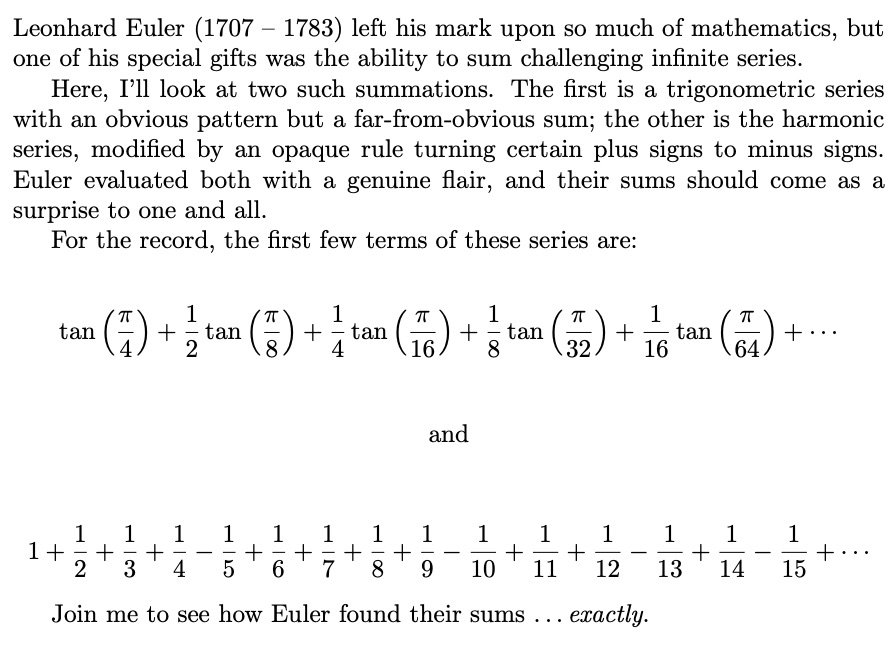Schedule of Talks for the 2022-2023 Academic Year
|
Date: |
Wednesday, October 5, 2022 |
|
Speaker: |
Prof. Sian Zelbo
The Brearly School and
Teachers College, Columbia University
Email: SianZelbo AT gmail DOT com
|
|
Title: |
A Re-examination of the Nineteenth Century French Influence on American Mathematics Education through Textbook Author Charles Davies
|
|
Abstract: |
The French influence on American mathematics education in the nineteenth century by way of the United States Military Academy at West Point is well documented. When Sylvanus Thayer took over as superintendent in 1817, he initiated a number of reforms that oriented the school towards the model of the Ecole Polytechnique.
Under Thayer's superintendency, Charles Davies served as Professor of Mathematics. In Davies' long career, he taught at least 780 cadets, many of whom taught mathematics themselves and West Point and at other colleges around the United States after graduation. Davies also spread his influence by publishing adaptations of French textbooks, which were so popular that they dominated the American market in the nineteenth century. This study takes a closer (and more skeptical) look at Davies' 1835 adaptation of Bourdon's Algebra and concludes that the mathematics that Davies transmitted to the United States by way of this loosely based adaptation was both outdated and intellectually incoherent. American mathematics education lagged behind the French long after and in spite of the well-documented period of French influence, and examining the details of Davies’ 1835 text helps to explain that disconnect.
|
|
|
Date: |
Wednesday, November 2, 2022 |
|
Speaker: |
Prof. Alexander Karp
Teachers College
Columbia University
Email: apk16 AT columbia DOT edu
|
|
Title:
|
Exploring personal archives: Mark Vygodsky and the History of Mathematics Education
|
|
Abstract: |
This presentation will be devoted to the life of Mark Vygodsky, Soviet mathematician, historian of mathematics and mathematics educator, Also, some methodological issues will be discussed.
|
|
|
Date: |
Wednesday, December 7, 2022 |
|
Speaker: |
Prof. Walter Meyer
Department of Mathematics and Computer Science
Adelphi University
meyer1 AT adelphi DOT edu
|
|
Title:
|
The History of College Algebra 1910-1930: A Surge of New Ideas
|
|
Abstract: |
In an earlier paper we described an era when College Algebra authors were quite restrained about introducing new ideas into their textbooks. Until the College Board intervened and caused a "crash," authors were content to do minor tinkering in regard to contents. Here we pick up the story in 1910 when an era of experimentation and change began. Issues that we take up include "unification" also known as "correlation" (often called "integration" today); and the addition of graphing and trigonometry to the typical contents of a College Algebra textbook. One can see this in the books of this era, support for 3 different styles of College Algebra. None of them was today's course in Pre-Calculus, but the latter surely has roots that can be traced to matters under discussion here. However, one can still see, in the balance of topics, an interest in breadth.
This work is a joint project of the Cajori Two Group, which includes Tom Bannon, Adelphi University; Larry D'Antonio, Ramapo State College; Michael George, Borough of Manhattan Community College; Joseph Malkevitch, Teachers College Columbia; Howard Sporn, Queensboro Community College; Patrick Wallach, Queensboro Community College; Rochelle W. Meyer, Nassau Community College (emerita).
|
|
|
Date: |
Wednesday, April 5, 2023 |
|
Speaker: |
Prof. Larry D'Antonio
School of Theoretical and Applied Science
Ramapo College
ldant AT ramapo DOT edu
|
|
Title: |
Mary Winston, an American in Göttingen
|
|
Abstract: |
In the 19th century women were not generally encouraged to study mathematics
(often they were actively discouraged).
This talk will discuss the pioneering woman, Mary Winston,
one of the earliest women to obtain a Ph.D. in mathematics.
Mary Winston (1869 - 1959) attended the University of Wisconsin,
graduating in 1889.
After taking graduate courses at Bryn Mawr College and the
University of Chicago, she met Felix Klein at the 1893
International Mathematics Congress.
Klein persuaded her to attend the University of Gö ttingen
to pursue a Ph.D. in mathematics.
Ln 1897, Winston was awarded a Ph.D. from Göttingen for her work on
Lamé equations.
She was the first American woman to receive a Ph.D. in mathematics in Germany.
In this talk we will not just discuss the struggles and triumphs
of this very interesting woman pioneer, but we will use her
letters to give a sense of the woman herself.
|
|
|
Date: |
Wednesday, May 3, 2023 |
|
Speaker: |
Prof. William Dunham
Research Associate in Mathematics
Bryn Mawr College
bdunham AT brynmawr DOT edu
|
|
Title: |
A Tale of Two Series
|
|
Abstract: |

|
|
